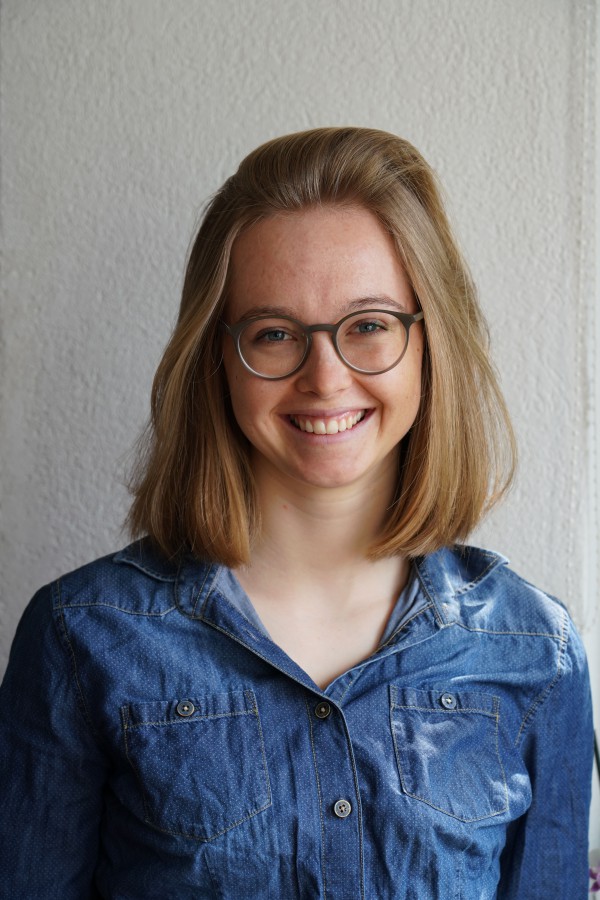Miriam Stuke
Interview by Carey Sargent, EPFL, NCCR MARVEL
Have you always been interested in science?
In high school I was more of the language type and so I studied Latin as a main subject and was thereby enrolled in a bilingual class that had most subjects held by English speaking teachers. Science always interested me though—as a child, we had nature documentations at home or those children’s movies where they show you how things work. But it’s not that I was always good at science school-wise.
How did you come to study Nanoscience at university?
Both of my parents are teachers, my father went into languages and my mother went into music, so those were topics I didn’t want to do! I was thinking I could go into informatics, I was hooked on KhanAcademy at the time and really enjoyed learning how to code, but then I thought that it might get a bit boring sitting in front of a computer all the time. I considered going into medicine, even though the lengthy education was something I didn’t really want to put myself through. I even did the practical in a hospital that you have to do if you want to study but I really didn’t like the environment. Maybe I was a bit unlucky with the station I was on. When the final date for enrolling drew closer, I just threw informatics and medicine out of the window and went with something different altogether. Someone studying nanoscience had told me at a party that “it’s really cool, you do informatics, you do biology, you do chemistry, it’s fun, really interesting,” and so I just enrolled. I didn’t even realize that it would have physics.

How did the physics go?
I didn’t really have a good physics background coming from a Latin course. I was struggling a lot with the topic during my first year, also because my knowledge of mathematics was just not advanced enough. It wasn’t until the second year where we had quantum mechanics. There I could really start from stage one with everyone else and started to enjoy physics. There was a logic behind it that I could relate to more, as there were no unforeseen Taylor expansions or simplifications. At least not until we hit a later stage. We had a really good professor, Prof. Sangouard, and his style of teaching made everything seem so logical and simple. He made quantum physics something I could relate to, like “okay, I see this. I can write it down, look at it and know how to calculate this and I know how to get from step A to step B.”
How did you hear about the INSPIRE Potentials Program?
Relatively early on I knew that if I was going to do the master’s in Nanoscience with the main course in chemistry I’d want to do three computational projects and I’d decided I wanted to my master’s thesis with Professor von Lilienfeld. I’d had a block course in his group and I really enjoyed it. I knew I would feel welcome and get the support I needed. After approaching him on this subject, I enrolled in a course he had suggested I take. After having confirmed that I wanted to do the master’s in his group on a subject he’d proposed, he mentioned that I could apply for the fellowship.
What is the topic of your master’s project?
I am working on the uniqueness of representations of chemical space that are used for machine learning. This means that I’m taking derivatives with respect to coordinates of a molecule in different representations.
Do women face specific challenges in the sciences?
I have not yet encountered any such difficulties. Maybe in secondary school but looking back it was probably because the girls were simply not paying attention to the teacher during math class.
Any advice for young girls interested in the field?
First of all, no topic will be taught in the same way as you experience it in high school. From my experience, everything is completely different. Math is not the same as math was, chemistry is not the same as chemistry was. And so for me it doesn’t really make sense to come from the gymnasium and say “I didn’t like chemistry there and so I won’t like it at university.” Though during the first year, of course, it’s basically just a recap. But then once you have this first year, you can dig into those areas that you find interesting. For example, I don’t really like parts of chemistry that were very important in the gymnasium, but I really enjoy organic chemistry. That was something that I took courses in. I also went into analytical chemistry, which is something that I’d never had during the gymnasium.
So as advice: just go for it. With a bachelor in any of the natural sciences you should do well on the job market, and then it’s really just a matter of picking the job that gives you the environment you can thrive in.
What are your plans for the future?
I don’t really know which path I’ll take, don’t know if I’ll do a PhD or not. So, in the next one or two years I’d like to get some hands-on experience working on a machine learning project in industry. I think that in the end I would really enjoy a position where I can either lead a project or where I can lead a small team of 5 to 10 people, and just try to keep everything on track, to help everyone to do their best work, or to try to tie everything together to get a good output. I think such a position can be anywhere, from university to industry to even starting my own small company.
